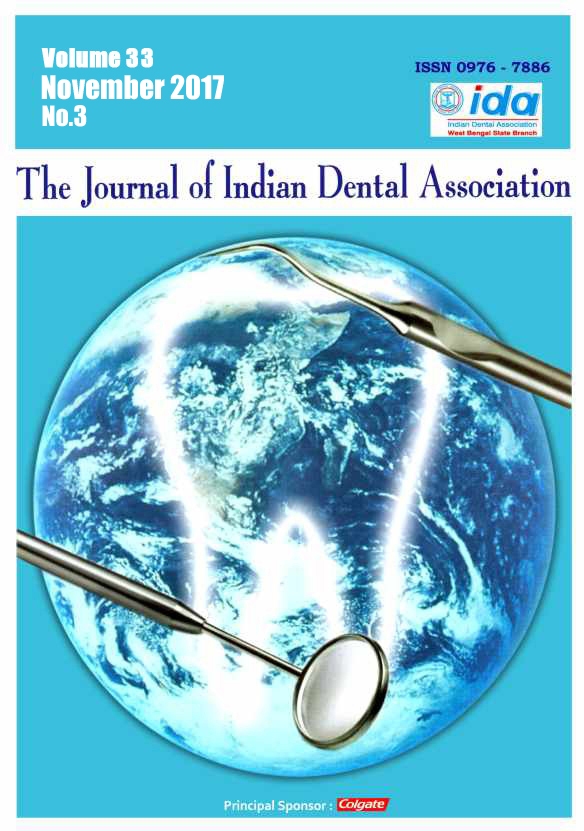Upcoming Events
1. Article Title.
2. Author Details.
3. Abstract.
4. Keywords.
5. Corresponding Author details.
November 2017
Volume : 33
No.: 3

Dr. Subhasish Burman ,Dr. Jayanta Saha,Dr. Soumen Mondal,Dr. Siddhartha Mishra,Dr. Mustafizur Rahaman,Dr. Sanjoy Roy,Dr. Chandmani Tigga,Dr. Malay Bachhar,Dr. Divya Chadda
Abstract: Adenoid cystic carcinoma is an uncommon tumour, accounting for about 1 % of all head neck malignancies and about 10 % of all salivary gland tumours. It is the most commonly reported malignant tumours of the minor salivary gland and is one of the most common cancers of major salivary gland (parotid, submandibular gland, minor salivary glands).Adenoid cystic carcinoma is relentlessly growing tumour characterized by perineural invasion and multiple local recurrences. Clinically AdCC is regarded as high grade neoplasm, and consequently the treatment of choice is radical surgical resection and is almost always followed by radiotherapy. Palate is one of the most common site of AdCC. Often after radical surgical resection (maxillectomy) reconstruction of the defect is needed for the rehabilitation. In this present case report surgical management of aAdCC of left side of palate and reconstruction of the post surgical defect is described
Dr. Goldy Lakar,Dr. Subhas Seth,Dr. Tamal Patra,Dr. Kumari Rupam
Abstract: In the recent years Lasers have gained immense popularity and completely revolutionized the field of dentistry. The field of orthodontics has witnessed a number of changes and has accepeted a number of innovations be it in appliance design, mechanics or armentaurium to reach greater heights in dentistry. In orthodontic practice, lasers have many common applications, including acceleration of tooth movement, bone remodelling, enamel etching prior to bonding, debonding of ceramic brackets, pain reduction after orthodontic force and prevention of enamel demineralization. Tissue problems also create challenging situations to orthodontists during treatment or post treatment. Soft tissue applications such as cosmetic gingival contouring, exposure of teeth to facilitate eruption, frenectomies, gingivectomy, gingivoplasty, operculectomy, removal of redundant tissue due to poor oral hygiene or space closure and removal of soft tissue to uncover temporary anchorage devices. The use of lasers in orthodontic practice enable us to achieve better treatment results.
Dr. Somen Roy Chowdhury
Abstract: Hypodontia or tooth agenesis is a developmental defect that affects a significant percentage of population. It is a multifactorial dental anomaly and involves genetic, environmental and evolutionary causes. Efforts and researches towards insight of the condition are important from the clinical and preventive aspects. Aim of the present review is to discuss the aetiological variations of common hypodontia cases.
Dr. . Debasish Pramanick,Prof. (Dr.) Anjana Mazumdar
Abstract: Coffin-Lowry syndrome (OMIM ID 303600) is a rare X-linked dominant genetic disorder and is associated with mutation of ribosomal S6 kinase 2gene, which is located on the short arm of the X chromosome and is designated as Xp 22. This syndrome has a distinctive facial appearance, with developmental delay, slower physical growth pattern, puffy and tapered fingers, along with few skeletal changes and often muscular hypotonia. Besides these, the orofacial findings like thick prominent lips, high arched palate, midline lingual furrow, microdontia, hypodontia, early tooth loss, and delayed eruption are quiet characteristic in this syndrome. In 1966, this condition was first demonstrated by Coffin and later in 1971, Lowry also presented such a similar report. In this case report and review, we demonstrate the orofacial findings in a 9-year-old female patient suffering from Coffin-Lowry syndrome.
Dr. Biswajit Das,Dr. Swapan Mazumdar ,Dr. Shreya Krishna
Abstract: Schwannoma, a benign, slow-growing neoplasm arises from Schwann cells of the nerve sheath of peripheral, cranial or autonomic nerves. Most Schwannomas are asymptomatic at the time of presentation, with a neck mass of variable size being the most common sign. Secondary symptoms like Horner's syndrome, hoarseness of voice, dysphagia depending upon the location of the tumour. FNAC, CT scan, MRI, USG help in preoperative diagnosis of the lesion. Surgical excision with preservation of nerve of origin (NOO) is the main treatment protocol. Post surgical histopathological examination establishes final diagnosis.
Dr. Sujata Kumari,Dr. Subrata Saha,Dr. Subir Sarkar
Abstract: An abnormal labiolingual relationship between one or more maxillary and mandibular incisor teeth is called anterior crossbite. During mixed dentition anterior crossbite is not an uncommon finding. Anterior crossbite correction in early mixed dentition is highly recommended as this kind of malocclusion do not diminish with age. Early diagnosis will help the practitioner to treat minor irregularities seen in developing dentition. It is easy to fabricate, low economical cost and easy to implement in rural areas with less lab. technique.. The current paper presents a case report which describe the successful treatment of anterior crossbite in children with mixed dentition using Hawley's appliance with double cantilever spring in a short period of 3 – 4 weeks without any damage to tooth or periodontium.
Dr. Saikat Mahata,Prof. (Dr.) Subir Sarkar,Prof. (Dr.) Subrata Saha
Abstract: Immediate replantation is the treatment of choice for avulsed permanent teeth, however sometimes immediate replantation can't be possible and avulsed tooth is stored in a suitable storage medium. The prognosis of replanted teeth largely depends upon the time gap between avulsion and replantation, and the type of storage medium used. Different storage medium have been tried, ranging from normal tap water to Hank's Balanced Salt Solution and Viaspan. This review has tried a comparative evaluation between different storage medium. By far the best known storage medium is HBSS for its physiologic pH, osmolarity and mitogenic and clonogenic ability.
Abstract: The prevalence of gingival inflammation varies significantly with age. Chronic gingivitis has been found in 100% by the puberty. The severity of gingival inflammation is believed to coincide with increases in circulating sex hormones associated with puberty and its immediate aftermath. These changes may lead to altered capillary permeability and increased fluid accumulation in gingival tissues, resulting of edematous, hemorrhagic, hyperplastic gingivitis in the presence of dental plaque. Three female patients with the age of 12years, 13-years and a 14 years old were reported to the department with same problems including bleeding from the gingiva while brushing and increasing the size of gingiva. History reveled no other systemic findings were present. On intraoral examination, there was presence of erythematous, enlarged gingiva in upper and lower anterior teeth region and also bleeding on probing was present with respect to upper and lower front teeth region. On radiographic examination there was no underlying bony defects were revealed. Based on history and clinical findings a provisional diagnosis of puberty gingivitis was made. Scaling and root planning was done and 0. 2% chlorhexidine mouth wash and gum astringent were prescribed. In third case the gingival enlargement was persist even after phase I therapy and planned for surgical intervention. Other two cases were resolved totally after phase I therapy. Periodic recall was done and oral hygiene reinforced at regular interval. These cases highlight the clinical features and management of pubertal gingivitis.
Dr. Sourav Saha,Dr. Satyaki Das,Dr. Sanjoy Das,Prof. (Dr.) Uttam Sen,Dr. Shambaditya Pahari
Abstract: The relationship between taper and axial height of the abutment tooth is most important for providing retention and resistance in a crown & bridge work. In addition, if a bridge is to be fabricated the angulation of the surfaces of the abutments is a vital requirement for single path of placement of the bridge. During tooth preparation,taper and its parallelism are important to better estimate the proper path of placement along with retention and resistance forms. The techniques of measuring the taper and parallelism of axial walls which are available till date are difficult to implement either because of their time consuming procedures or due to expensive equipments. To overcome these difficulties in clinical procedures, a device is fabricated which will measure the degree of taper and the parallelism of axial walls simultaneously. This paper focuses on fabrication of a new device which will help in determining taper and parallelism of axial walls simultaneously in a simplified way.
Dr. Arun Choudhary,Dr. Avik Mohanty,Prof. (Dr.) Manoj Chowdhury,Prof. (Dr.) Ritesh Gourav,Prof. (Dr.) Pratheek Shetty
Abstract: Traumatized anterior teeth with sub‑gingival crown fractures are a challenge to treat. The management of patients with traumatic injuries to their dentition poses a seriou challenge in everyday general dental practice. For the rehabilitation of the complicated subgingival crown fracture of anterior teeth, multidisciplinary approach is often indicated. A combination of endodontic, orthodontic, periodontal and prosthodontic approach may be required. Orthodontic or periodontal intervention becomes an integral part for the exposure of the sound tooth structure of fractured anterior teeth with fracture line extending subgingivally. The aim of this paper is to discuss the immediate endodontic management followed by orthodontic extrusion of traumatized upper anterior teeth with fracture at the subgingival level. In order to expose the sound tooth structure for prosthodontic intervention, orthodontic extrusion was performed after endodontic treatment. To avoid extraction of the involved teeth, the multidisciplinary approach was adopted and finally the teeth were restored prosthodontically. The final result was aesthetically pleasant, cost-effective and periodontically sounds.












